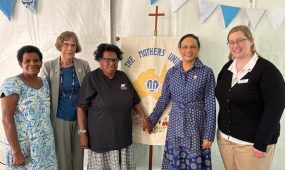Religious leaders' joint statement on high-quality end-of-life care
News
As the Queensland Parliament continues its inquiry into palliative care and voluntary assisted dying, Archbishop Phillip Aspinall has signed a joint statement on the provision of end-of-life care, along with 15 other Queensland religious leaders. They are uniformly opposed to voluntary assisted dying, and are committed to the proper funding and availability of palliative care founded on the promotion of human dignity, human freedom and the common good

A Good Death: Queensland Religious Leaders’ Joint Statement on the provision of high-quality end-of-life care
Our Vision for Queensland
As leaders of religious organisations in Queensland, we believe that our society should be caring and compassionate, founded on the promotion of human dignity, human freedom and the common good. We believe that:
- All Queenslanders are worthy of being valued and feeling valued by our society, regardless of the circumstances in which they find themselves. Our leaders and laws should affirm the fundamental worth of all Queenslanders at every stage of life in every circumstance of life.
- All people are free and capable of living meaningful and purposeful lives. The meaningfulness of our lives as free beings and as a community should be affirmed and fostered by society, including our government and government agencies.
- As a community we should work together to secure the common good. The common good is all the material and social conditions necessary for all individuals to live truly meaningful, purposeful and fulfilling lives in and through their relationships with others. These conditions include access to high-quality health care, aged-care and end-of-life care that address people’s physical, psycho-social and spiritual needs.
Hearing the Question Properly to Start the Right Conversations
We understand that some Queenslanders are experiencing extreme physical, mental or emotional suffering. When these people tell us that they think the best solution would be for us to help them to take their own lives, or even end their lives for them, we should be very concerned. To respond by giving them the legal and physical means to do so is to fail in our responsibility as a society on at least two counts:
- It is a failure because we have done nothing to improve the circumstances that lead to people experiencing such unnecessary and avoidable suffering in the first place. This is especially problematic when the means do exist as evidenced by the very positive experiences of high-quality specialist palliative care.
- We have failed in our responsibility to affirm the worth of every Queenslander and the meaningfulness of every life, leading some among us, especially the most vulnerable, to believe that they are worth nothing and that they would be ‘better off ’ dead. This can never be regarded as a compassionate response to the crisis of suffering.
‘Voluntary Assisted Dying’ is not dying well
Death is part of life. Dying well is an important part of what it means to flourish as individuals and communities. We maintain that ‘voluntary assisted dying’ is not dying well. We believe that the Queensland Government should maintain the current laws and improve palliative care for a flourishing Queensland based on human freedom, human dignity and the common good.
- Queenslanders are being denied the choice of best practice end-of-life care
‘Voluntary assisted dying’ legislation undermines human freedom because such legislation seems to offer a misleading choice: you can choose to die horribly or you can take your own life. High-quality specialist palliative care means that death does not have to be horrible. High-quality specialist palliative care also means that you do not have to take your own life to avoid a horrible death. High quality palliative care is not merely a third option; it is best practice. Queenslanders do not yet have universal access to such specialist palliative care that addresses the physical, psycho-social and spiritual needs of people. This problem should be addressed by providing all Queenslanders with access to this best practice end-of-life care. - Do we really want a law that tells us that we will all eventually be worthless?
‘Voluntary assisted dying’ undermines the foundational social affirmation of the equal worth of all human individuals by legally enshrining the idea that some human lives are not worth living. It legally enshrines the idea that these ‘lives-not-worth-living’ can be directly and intentionally ended with the aid and blessing of the state. Making such ideas into law gives the impression that this is the proper attitude of and for our society. Such a message puts vulnerable people at risk of coercion and elder abuse
People who feel that they are a burden, or who already feel that their lives are worthless are particularly vulnerable. But we are all vulnerable to the suggestion that there may come a time when, no matter how successful and important we may be, we will become dependent on others for our care. We fear the guilt of being a burden on other people, the loss of control over our own lives, and the potential humiliation that can come from having to rely on others for our basic needs. How much more so would we feel this way if the law implies that we are indeed a burden, that we are right to think that we worthless, and that the right and noble thing to do would be for us to end our lives before we become a burden on those we love and on society? Such a law undermines the reality that we flourish both as individuals and as a society precisely in and through our caring for others and being cared for by others. In this, ‘Voluntary Assisted Dying’ affects other people’s rights, not just those of the patient. Human beings and human societies are at their best when they are involved in relationships of mutual love, concern and consideration, sometimes as givers and sometimes as receivers of such care. The law should foster such interactions, not undermine them.
- It’s the wrong message when we have a crisis of suicide in our state
‘Voluntary assisted dying’ undermines efforts to address the crisis of suicide in Queensland. The government and our society should not be affirming the idea that some lives are not worth living at a time when Queensland has the second-highest suicide rate in Australia. Consequently, we maintain that ‘Voluntary Assisted Dying’ should not be legalised in Queensland.
Dying well does not mean prolonging life at all costs or living in pain
We want to make our position clear. We oppose the legalisation of any direct action specifically intended to bring about the death of a person. This includes the provision of lethal substances for that purpose or the administration of such lethal substances by any means for that purpose.
We continue to support the long-held moral and legal distinction between such direct intentional actions to bring about the death of a person and:
- proportionate refusal, withholding or withdrawal of medical treatments that promise little or no benefit, or that are overly burdensome at the end of life
- appropriate intentional provision of medication to alleviate symptoms of pain and suffering.
It is clear that these legitimate practices are not well understood in Queensland. Many people believe that the medical fraternity – or indeed their religion – requires them to prolong life at all costs, regardless of the burden. Many people also think palliative care is like euthanasia because the ‘pain medications will kill you anyway’. This is not the case.
As religious leaders, we commit to doing our part to support initiatives to educate people concerning:
- appropriate refusal, withholding and withdrawal of treatment;
- the distinction between alleviating pain and direct intentional killing; and
- the benefits of high-quality specialist palliative care that addresses the physical, psycho-social and spiritual needs of people.
We strongly endorse government initiatives in this direction. We believe better end-of-life care begins with better conversations about death and dying and how we can die well in ways that do not undermine the foundational values of our society.
We Support High-Quality Palliative Care, Education, and Better Conversations about Dying
The better answer to the suffering we see is to address the circumstances using the best practice available. We support all efforts to empower Queenslanders to make meaningful choices about their end-of-life care and to develop a world-leading healthcare system that genuinely takes care of people from the cradle to the grave.
- The problems evident in aged care should be urgently addressed.
- Palliative care services should be improved both in quality and in accessibility.
- Support and resourcing for the spiritual dimension of healing, and so for chaplaincy and spiritual care in hospitals should be prioritised.
- Education about what high-quality palliative care is should be supported and myths that create false and unwarranted fears and uncertainties about the dying process should be refuted.
- Support and encouragement should be given to research into better palliative care and into how palliative care can foster lives that have meaning and value in a society that affirms human dignity at every point.
Signatories
- The Most Rev Dr Phillip Aspinall – Archbishop, Anglican Church Southern Queensland
- Rev David Baker –Moderator, Qld Synod, Uniting Church in Australia
- Rev Peter Barson – Director, Ministry Resourcing & Christian Education, Presbyterian Church of Queensland
- Mr Geoff Charles – Conference President, Churches of Christ
- The Most Rev Mark Coleridge – Archbishop, Catholic Archdiocese of Brisbane
- Dr Joe Goodall – Moderator, Qld Congregational Fellowship
- Rabbi Nir Gurevitch – Gold Coast Hebrew Congregation
- Pastor Gary Hourigan, State Chairman, International Network of Churches
- Rabbi Levi Jaffe – Brisbane Hebrew Congregation
- Mr Habib Jamal – President of the Islamic Council of Queensland
- Elder Carl R. Maurer –The Church of Jesus Christ of Latter-day Saints – Area Seventy – Pacific Area
- Pastor Carl Mutzelburg – Acts 2 Alliance
- Rev Stewart Pieper – Acting General Superintendent, Queensland Baptists
- Rev Rex Rigby – Wesleyan Methodist Church, District Superintendent Sth Qld
- Rev Paul Smith – Bishop of the Lutheran Church of Australia, Queensland District
- Pastor Gary Swenson – State Ministries Director, Australian Christian Churches Qld/NT
The full submission may be downloaded for ease of printing.





